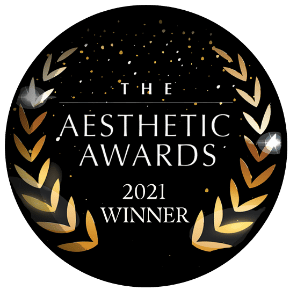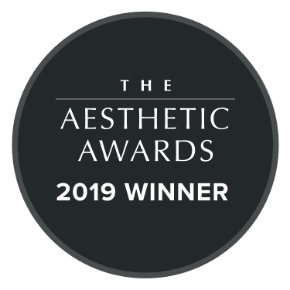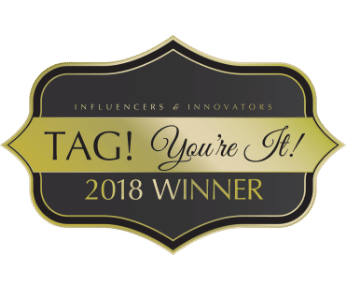Ending Up In The Aesthetics World:
Mara: To start, can you give like a 30-second version of, how did you find your way into this particular space?
Anjail: I was really supposed to be on like a temporary contractor basis. Fast forward, 10 years later, I’m still here and the company’s changed hands, four times now.
Changes In The Industry:
Mara: As a strong educated, brilliant modern black woman, you have a really great perspective when it comes to what you are seeing in the industry. Now, as far as changes, or maybe lack thereof, have you seen enough changes in the industry, over the past decade or so?
Anjail: Over the years, there has been a change. I don’t want to say there’s been a lot but at least now I see the effort toward it, as far as, seeing more diverse images and people of color. So, I’ve seen the pendulum swing that way, but I do think there could be more. When I look at things, especially in the field of aesthetics, I’m definitely not a provider, but I’m closer to the patient perspective. I don’t see a lot of representation, as far as African Americans and like skin. We’re not the standards so I don’t see much representation there. I think that could be an issue as far as why we’re not reaching as many African Americans as we could because we don’t see ourselves represented in this space, even though we should. We believe in a culture of beauty and things of that nature, and in aesthetics, I don’t see it so much.
Lack of Representation:
Mara: Representation matters, and if you don’t see yourself you’re less likely to want to participate in whatever it is. When we talk about a lack of representation, are you looking at imagery, education that’s available? Let’s dive a little bit deeper into, what you mean by that.
Anjail: It’s the whole gauntlet of things for sure. I definitely don’t see a lot of imagery, and as far as my company, I know that we are working harder toward that. That’s what I enjoy, I’m seeing a lot more magazine covers with darker skin tones, and I’ve seen a shift toward a more inclusive education, and a lot of our lectures are focusing more so on dark skin and how to treat it. These are the things that we need to see and offer because that translates into a more inclusive industry and reaching a larger chunk of our demographic as well. When I first started I didn’t see a lot of lectures on treating dark skin and things of that nature. I would often hear that it’s just harder to treat our skin, and that’s all I heard, so I don’t really know, where to go as far as who would be an expert on my skin. I think we could do better, as far as, educating us, letting us know that we belong in the space too. As far as providers, we could do more there and just try to reach a broader scale of patients.
Mara: For you to say, even coming from that experience personally, that you couldn’t even tell people where to go, speaks for itself. To not be able to see that representation for you, who is someone who works inside the industry in a major aesthetic hub, says something.
Representation on Social Media:
Mara: At one point, you were managing social media accounts for organizations within the aesthetics industry. When you’re looking at what others are doing, what are you seeing that could be done differently in social media? What are you seeing that someone is doing right?
Anjail: When I was managing the social media accounts, what I saw and see now, on social media is that people love black culture but not black people. More people are going for things that black people were known for and it wasn’t good looking, but now it’s a trend to have bigger lips and bigger butts and heavier bodies but not on black people. That’s what I’m seeing a lot of, on social media, and a lot of cultural appropriation but not so much credit to that. I think it affects both sides, either people are upset that that’s happening, or we’re seeing that it gives us a lower self-esteem as far as why doesn’t it look good on me, but it’s good somewhere else. How do you change that and how do you approach it? I mean, at least we are seeing more diversity, but that’s still happening everywhere.
How does that affect you, from a patient perspective?
Anjail: From a patient perspective, and even on social media, that’s how I find providers for me. I may be on there for work, but then I see someone’s page, and that’s how I find something for myself, or how I refer a friend. I’m looking at everything, I’m looking at your page, I’m looking at the language on that page. If there are diverse images, I’m looking at the language you use underneath that, like I’m looking at every single thing. Are genuinely diverse or are you just adding those images to appear diverse. For me, top to bottom, I’m watching it all.
How Language Effects Diversity:
Mara: Let’s talk about language. What sort of language makes you feel that there is less of a divide, or that practice or company is being genuine versus the language that you’re seeing where you say, this is not genuine?
Anjail: I will say that the language that I believe, is as if it appears that you’ve done your homework. You speak on darker skin or things of that nature in a positive light. I would consider myself a layman in terms of medical terminology and things of that nature, but anytime I sat in on a skincare lecture and things of that nature I just mostly heard how hard it is to treat black skin or dark skin. From that, I would conclude that there is no one qualified to treat my skin, so if I hear someone who sounds like they know what they’re talking about and they really focus on dark skin with an emphasis on treating dark skin, then I’m convinced and I want to know more.
Mara: Treating darker skin is not an afterthought, it needs to be thought of as this is a service we provide. One of the things that I hear you saying and that we’re talking about is, it starts with the education that providers are receiving. We need providers to feel qualified, showcase that they’re qualified, and be qualified. You have to think where does it come from? Does it come from laser companies, or skincare companies to make sure that they’re providing that education? Or does that come down to the doctors, making sure that they’re taking that initiative, or is it all of the above?
Anjail: I think is all of the above. That’s where you come in and how I would say, market to us. We definitely have a huge market out here, and buying power. I pay attention to social media trendsetters and things change when we start moving. I think there probably are a lot of doctors out there that really do know what they’re doing and treating us but again the afterthought effect happens where they’re not like really thinking of reaching us. Reach us and you will be surprised how much we participate. I feel like that’s kind of starting to resonate just in the world in general right now, when we decide that we want something, things happen.
Mara: Absolutely. And I know that the conversations going on in the world around us are so much bigger than the aesthetic community. However, this is a small corner of the world where we have the potential to make that difference sooner rather than later. We have the audience and we can speak to the audience. What’s going on in the world is not nearly as important as the aesthetic community, part of the it’s part of a bigger, bolder conversation. However, even trickling down and talking about skincare and skincare usage. You and I have had a conversation, even surrounding sunscreen.
Anjail: I still have family and friends in my circle that believe black people don’t need sunscreen. They think the fact that it’s harder for us to get skin cancer that we just don’t need it. I’m 40 years old and people ask me and are shocked that our skin can tan. If you have skin it’s like anything, it can burn. The education needs to be there, we need to be reached. It’s definitely an open field right now.
What would you love for those changes to be?
Anjail: I would say representation matters. I think if people were putting more dark-skinned images and people out there and celebrating that beauty without a Eurocentric lens. I think that will really help, just turn the page on things. If we start gradually showing these things in every aspect of our world, things start to change. I just think images and representation and just being more conscious and aware of things will help a lot.
Last Thoughts:
Mara: Is there anything else, before we wrap up our conversation, that you would like to add?
Anjail: I would say more patient outreach on the provider’s side would help a lot. Like I said, I just wouldn’t know where to go, who knows about me, who can serve me. Honest to goodness I was looking for a dermatologist in Orange County, and I googled doctors who will treat dark skin or doctors who are experts in African American skin, and I didn’t find a lot. Surprisingly, I google everything and I find anything on Google, and that’s one of the things that has stumped me.
Mara: This comes down to even something for when we talk to our practices. As a website vendor, how can you help prospective patients, with skin of color, find the services that they’re looking for? You shouldn’t have to go three or four pages deep on Google. First of all, no one should have to go four pages deep on Google for anything, but that it should be easier for you to find what you are looking for, especially when you’re that hyper-focused on what you’re looking for. I think the other call to the website vendors is to speak with your practices. If your practices don’t come to you, wanting to do more, take it upon yourself to have those conversations with your clients, with the practices themselves, and say this is what we need to do to showcase a practice being able to treat skin color.














